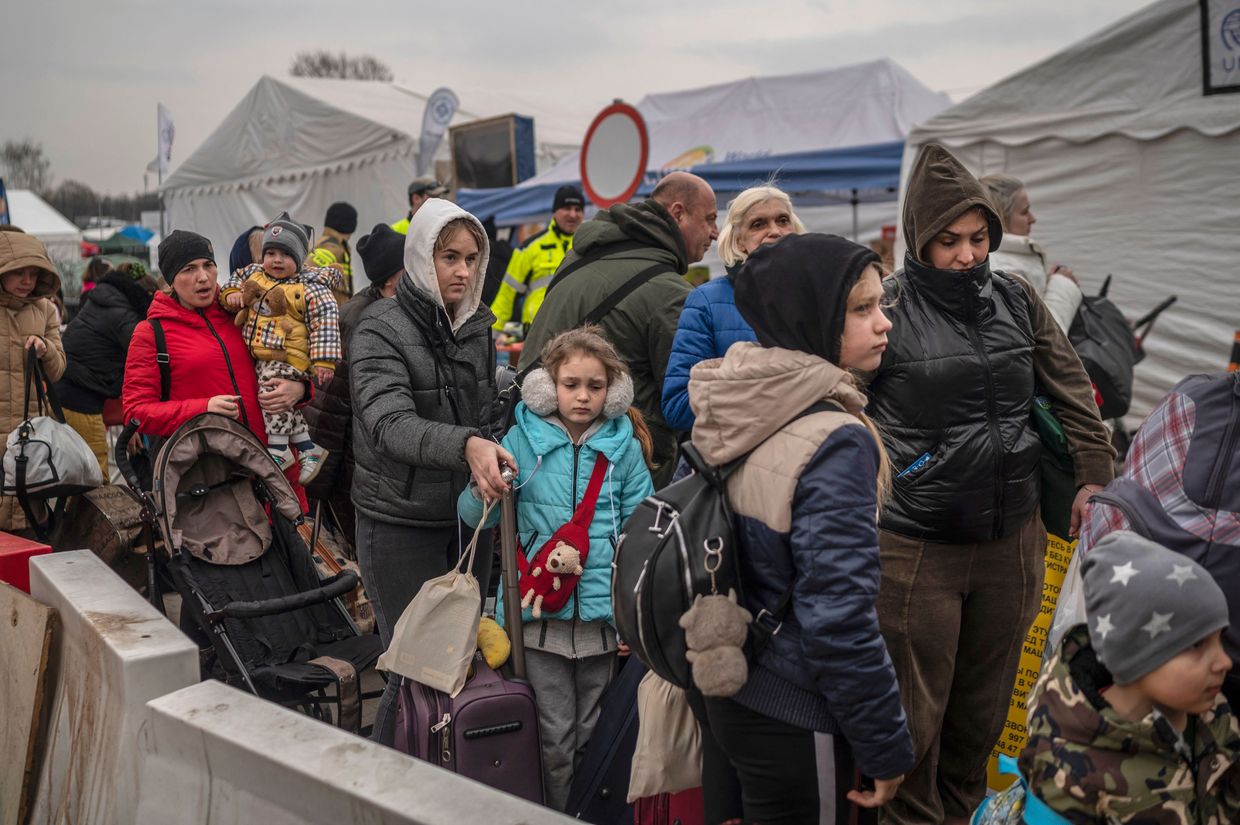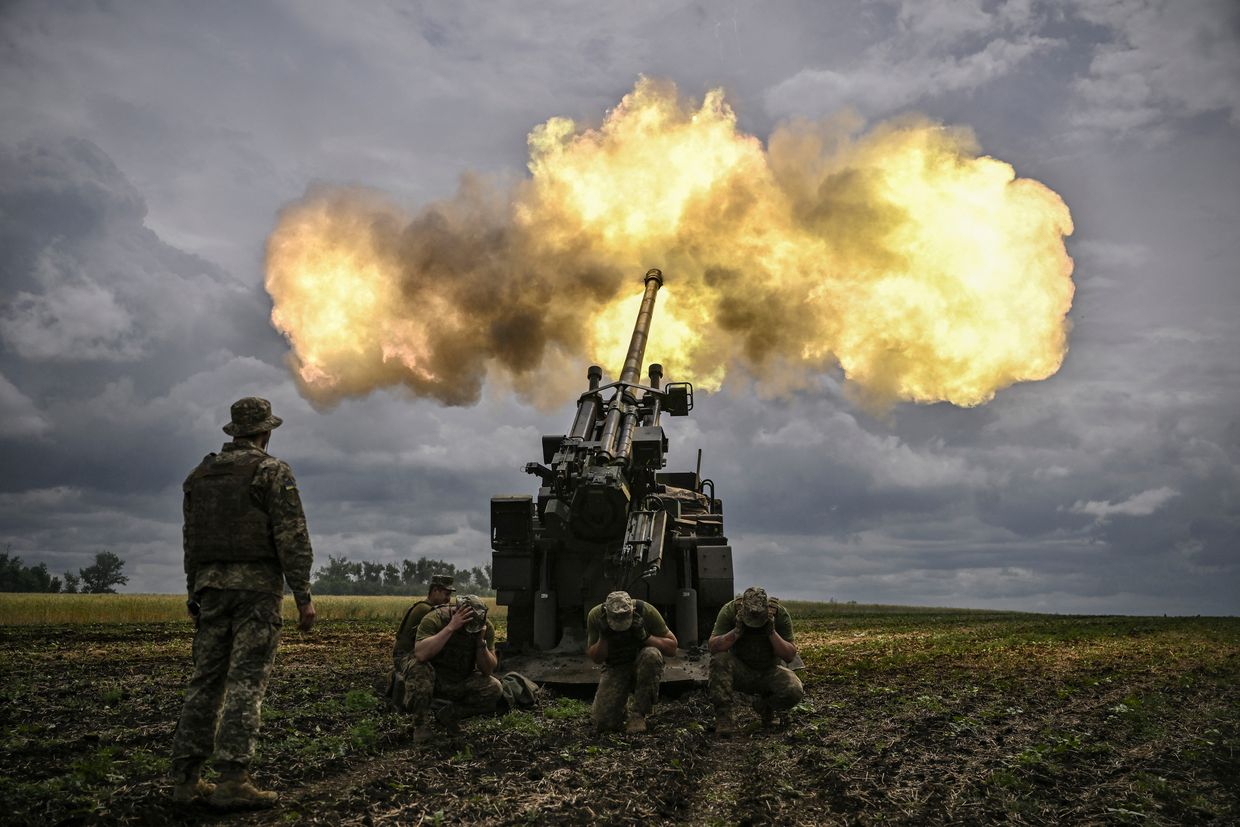Opinion: The West’s escalation strategy has failed. Let Ukraine strike Russia.
Washington's policy barring Ukraine from striking Russian territory with U.S.-supplied weapons protects Russian air bases over Ukrainian civilian infrastructure.

Ukrainian soldiers watch as a HIMARS system launches a rocket near Bakhmut in Donetsk Oblast, Ukraine, on May 18, 2023, amid Russia's invasion of Ukraine. (Serhii Mykhalchuk/Global Images Ukraine via Getty Images)

Isaac C. Flanagan
Co-founder of Zero Line
Editor's Note: This article was originally published by Trench Art on July 30, 2024, and has been republished by the Kyiv Independent with permission.
In his Oval Office address on July 24, U.S. President Joe Biden rightly claimed credit for being the “first president of this century to report to the American people that the United States is not at war anywhere in the world.” However, his persistent refusal to declare that the U.S. wants Ukraine to win its defensive war against Russia will make it far less likely that any of his successors can say the same.
“Rallying a coalition of proud nations to stop (Russian President Vladimir) Putin from taking over Ukraine and doing more damage,” as the United States did in 2022, is not enough in 2024. If Biden wants future presidents to ensure peace and prosperity for the U.S. and its allies, he must use his remaining time in office to finish the job in Ukraine.
Two and a half years of escalation management, however well-intentioned, have failed. Limiting allied support for Ukraine to specific weapons systems and rules of engagement – treading softly lest we upset Russia – has prolonged this war at great cost. Those of us living in Ukraine are among the most vulnerable Americans to hypothetical Russian escalation. Living in central Kyiv means living close to strategic targets, but most of my fellow U.S. citizens here would agree that Western timidity is far more dangerous.
At every stage of Russia’s full-scale invasion of Ukraine, the U.S. has given Ukraine less than it needs to achieve its military objectives, and much later than it needed it. Our support is inadequate not only in terms of material goods like weapons systems, armor, and aircraft but also in terms of our stated policy objectives toward Russia.
Some experts argue that a cautious approach is necessary to avoid provoking a wider conflict with Russia. They contend that providing Ukraine with unrestricted support, including advanced weaponry and the authority to strike targets on Russian soil, could lead to a direct confrontation between NATO and Russia, potentially triggering a broader, more devastating war. Such analyses underestimate both the risks of a prolonged conflict and the strategic advantage of strong support for Ukraine.
History has shown that appeasement and half-measures only embolden aggressors, while decisive action constrains them.
Since Feb. 24, 2022, Putin and his surrogates have articulated 19 specific red lines. We have already violated 17 of them, including the threat not to supply the Patriot missile system, not to expand NATO eastward, and not to supply longer-range missiles to Ukraine.
The past two years have shown that Moscow’s response to bold actions by Ukraine and its allies is not Armageddon, but retreat – like leaving its 1,340-kilometer (832.6-mile) border with new NATO member Finland undefended, or removing all of its warships from occupied Crimea in response to Ukrainian strikes. Typically, at such moments, Kremlin surrogates revert to vague talk of “negotiations,” while buying time to rearm.
Providing Ukraine with the tools and permission to strike Russian military targets wherever they are would hasten the end of the war, reducing overall instability and the long-term risks of a wider conflict. A strong and swift response would signal to other adversaries that the democratic alliance is determined and prepared to defend not only its territory but its values. Rather than deterring ourselves through an aspirational posture of de-escalation, we must deter future aggression by our enemies and buttress global stability.
With advanced weapons and permission to strike Russian military targets in time for the fall 2022 offensive, Ukraine could have been close to winning this war by now. Instead, repeated delays in assistance, driven by a misguided fear of provoking Putin, have given Russia the luxury of time to conscript more soldiers, make Ukraine the most heavily mined country in the world, and share information about our weapons systems with other adversaries like Iran, China, and North Korea.
This approach has not only failed the Ukrainian people, it has endangered our allies worldwide.
We must articulate a clear theory of victory for the democratic alliance: no more feel-good platitudes like “we stand with Ukraine for as long as it takes” or vague aspirations to “end the war” on unknown terms. Instead, we must uphold Ukraine’s sovereign right to its 1991 borders, in accordance with the obligations of the UN Charter, the 1994 Budapest Memorandum, and the 2003 Treaty on the Russian-Ukrainian Border, with the following policy changes:
- Timely delivery of advanced weaponry in sufficient quantity to retake captured territory, without restrictions on striking military targets on Russian soil;
- Use Excess Defense Articles authority to donate the 4 million orphaned 155mm cluster munition shells currently in U.S. inventory;
- Implement sanctions with teeth, including secondary sanctions for gray-market middlemen and oil and gas “ghost fleets;”
- Expand allied funding for Ukrainian-produced weapons, particularly missiles;
- End restrictions on contractors operating in Ukraine.
Securing the future of this democracy and defending democracy in general is crucial. This isn’t just about Ukraine; it’s about setting a global precedent. Biden should cement his legacy by ensuring that freedom, innovation, and deterrence are at the forefront of his administration’s foreign policy.
As Biden reminded us in his speech, he’s spent five decades in politics as a public servant standing up for the values of the heartland and the very soul of America. I haven’t been home to see my friends and family in over a year, but I’ve never felt more American because the spirit and values of America are alive in Ukraine today.
The coal mining families in Scranton have the same hopes and dreams as the coal mining families in Vuhledar. Every day, their men and women, sons and daughters say a prayer, put on their body armor, and descend into the trenches to face Putin’s troops and risk their very lives for the same values we hold dear: faith, family, and freedom.
What the President said about America is true here as well: Ukrainians are a nation of promise and possibilities, of dreams and doers, of ordinary people doing extraordinary things.
The consequences of policymakers’ caution, however logical in 2022, are now being measured in rubble and blood. We sit on our hands and allow Russia to kidnap Ukrainian children by the planeload, to target and send giant missiles into neighborhoods, destroying hospitals, kindergartens, universities, train stations, houses of worship, theaters, shopping malls, and pizzerias with impunity.
We let them wipe entire cities off the map; we let them torture, massacre, and bury people in mass graves, yet we won’t let Ukraine use U.S.-supplied weapons to strike military airfields and missile launchers. U.S. policy, as it stands, protects Russian air bases over Ukrainian civilian infrastructure.
Putin is a war criminal, and Ukrainian schools, restaurants, railways, and churches are not random targets; they are deliberate. He intends to destroy not just buildings but the culture and very soul of Ukraine. If we stand for anything as Americans, we must uphold our heritage and keep the beacon of freedom burning brightly from our shining city on a hill. We must stand not just with Ukraine, but for it; to do otherwise would be to stand for nothing. The world looks to us for unflinching leadership, as it long has. We have a moral obligation to act decisively in this moment.
In the third year of this full-scale war, it’s time to admit that the Western doctrine of escalation management has failed. It has failed the Ukrainian people, it is failing our strategic interests, and it is failing the entire world by emboldening our enemies while providing them with the greatest combat laboratory in three generations. NATO alliance members have a combined 20:1 GDP advantage over Russia; let us now stop worrying about Putin’s feelings and instead let him fear our resolve.
Mr. President, the only way to defeat Russia is to actually defeat Russia. Now it’s time for your administration to make its final push: to support Ukraine vocally, demonstratively, and unequivocally to win now, to pave the way for a lasting victory and a durable peace that will protect democracy worldwide, and to ensure your legacy and our country’s continued legacy of being on the right side of history.
Editor’s Note: This article was originally published on the Substack blog Trench Art on July 30, 2024, and has been republished by the Kyiv Independent with permission. The opinions expressed in the op-ed section are those of the author and do not purport to reflect the views of the Kyiv Independent.












